Here’s the presentation I gave at the 2019 Pop Conference, where the theme was MUSIC, DEATH AND AFTERLIFE. As soon as that theme was announced, I knew I was going to pitch a paper about the odd history of “Seasons in the Sun,” and how/why Terry Jacks made it a multi-million selling success, when multiple artists before him had recorded remarkably similar versions of the song that went nowhere, commercially.
By some miracle, I got through the entire talk without crying once.
Once a year when I was in grade school in the mid-’70s, my parents would rent a jukebox and throw a party. The jukebox was always delivered on Friday afternoon, and wouldn’t be picked up again until Monday morning, which meant my brothers and I had the entire weekend to make it play whatever we selected. This was a big deal, once upon a time.
Renters got to choose what songs it would be stocked with, and there was one record I always insisted upon: “Seasons in the Sun,” by Terry Jacks, a song sung from the perspective of a dying man as he bids adieu to his friends and family.
I remember dancing to “Band on the Run” and “Waterloo,” but those were not songs I needed to hear more than once or twice in a day. Whereas I would play “Seasons in the Sun” repeatedly, and whenever it came on I would sit down directly in front of the massive silver speaker and let the sound wash all over me. And, invariably, I would cry. Because it was so fucking sad.
But crying along with “Seasons in the Sun” made me so fucking happy – as happy as I felt sliding across the wooden floor in my socks to Wings or ABBA. Granted, my family were suburban WASPs who were so embarrassed by any displays of emotion that even saying “I love you” to one another felt vaguely rude, so I had no experience with which to gauge the quality of any sentiment that interrupted my standard kid obliviousness. I just knew I was feeling something, and that it was odd and exciting and seemed worth making happen again.
So once a year I would spend three days mourning sincerely for a stranger who didn’t really exist, and lamenting for the loved ones he left behind, who didn’t exist either. It didn’t seem weird at the time. I just figured it was a really good song.
“Seasons in the Sun” is not a really good song. But it did sell a fuck ton of records for Terry Jacks, and not everybody who bought one was as young and stunted as me. There has to be a reason.
Since Jacks did not write the song, and since it had been released by multiple different artists in the decade before he made it a hit, that reason is probably hiding somewhere inside his particular recording. The mystery ingredient can’t be his voice, which is remarkably affectless for someone on the verge of death. And I doubt it’s the music, though the bassline is compellingly hypnotic, and those intro sproings were supposedly played by guitar legend Link Wray.
Jacks’ genius lies not in what he added to “Seasons in the Sun,” but what he removed. The story of the song’s success is one in which a sardonic Jaques Brel ballad gradually had any hints of sophistication stripped away to reveal a gloriously lachrymose heart. Though the result feels treacly, I want to convince you that his actions were courageous — that only by fearlessly embracing the song’s saccharine center could he make tens of millions of humans wrestle with an existential dread we studiously try to avoid.
I didn’t learn there had been earlier versions of “Seasons in the Sun” until the mid-’80s, when I chanced across a used copy of a 1964 Rod McKuen LP by that name.
I knew of McKuen as a weirdly successful mass-market poet whose books had titles such as Listen to the Warm,
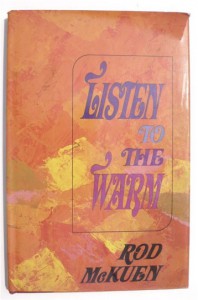 but I hadn’t realized he sang as well. As if it sensed my doubts, the back cover of the LP offered helpful testimonials from famous music critics such as Vincent Price and Phyllis Diller.
but I hadn’t realized he sang as well. As if it sensed my doubts, the back cover of the LP offered helpful testimonials from famous music critics such as Vincent Price and Phyllis Diller.
With plaudits like those, five dollars seemed like a steal, so I bought the record and took it back to my dorm room. Liner notes inside the gatefold by McKuen himself informed me that he’d translated “Seasons in the Sun” from Jaques Brel’s “Le Moribond” – literally, “The Dying Man.” McKuen claimed he “tried to stay as close to the original French lyrics as possible, though it was difficult since things that are sung as commonplace in France are sometimes thought too ‘rough’ or even sentimental here.”
I’m going to play you McKuen’s version – I’m going to play you ALL the versions, and you are going to have the chorus stuck in your head for at least the rest of the day, if not the week, and I am not sorry at all – but we really have to start with Brel’s original song.
Those English subtitles aren’t a precise translation of the French, but they give you the gist. Our dying man says goodbye to four people he expects to take good care of his wife: first, his best friend, Emile, with whom he’s shared songs of wine and women. Then, his wife’s priest, whom he respects even though they don’t share the same beliefs. Third, a dude named Antoine, whom he doesn’t like at all (Antoine’s his wife’s lover, but our narrator doesn’t seem to hate Antoine for that as much as he does for just being so damn boring). The fourth and final goodbye is to the unfaithful wife. He loves her, and he’s sad to die, but decides it’s OK his eyes will be closed for eternity, since he was pretty blind about their relationship.
After each goodbye, he sings the same chorus, which expresses a simple wish: he wants everyone to laugh and dance and act like fools when they put him in the hole.
So, it’s pretty French (Terry Jacks claims Jacques Brel told him the song was written in a whorehouse in Tangiers, but as we’ll see Terry Jacks is not the most reliable narrator). The overall mood isn’t maudlin, it’s one of cynical detachment. Death comes for all of us; our singer is just getting on the train a bit earlier than he’d expected. Maybe he’s more direct with the priest and Antoine than good manners would usually allow for, but his declarations are all pretty reasonable and dignified.
In fact, it’s hard to determine just which bits were supposedly too “rough” for American ears in 1963, because McKuen’s translation doesn’t merely keep the adultery, it makes that betrayal the fulcrum of the song.
Based on McKuen’s liner notes, I had always assumed his version hewed closely to Brel’s original, deviating only where Brel had gotten too dirty for our puritanical ears.
But McKuen hasn’t really translated the lyrics at all. He’s taken the melody and the conceit of a dying man bidding adieu to his loved ones, and grafted them on to a short story with a surprise ending. Now, there are only three goodbyes: Antoine’s been removed entirely, making Emile both the friend and the betrayer; the priest has been replaced with a more literal father; and the wife is given a name (a French name!) and a warning – our singer is going to haunt her from beyond the grave because she cheated on him with his friend.
All he’s kept lyrically from Brel’s song is the word “adieu,” the name Emile, the wine and song, and the fact that it’s hard to die in spring. But where that sentiment was the beginning of a thought that ends with acceptance for Brel (“I’m going to the flowers with peace in my heart”), McKuen milks it for every drop of pathos he can by making “die” the end rhyme, and a cheesy evocation of Spring the thing that rhymes: it’s hard to die when all the birds are singing in the sky.
Then he makes an even more profound change. He throws out Brel’s entire chorus about wanting everyone to laugh and dance and go crazy at his funeral and replaces it with recollections of what he and Emile and Papa and Francoise all shared in the past: “we had joy, we had fun, we had seasons in the sun.” Where Brel focuses on the future, expressing a forward-looking wish about how the people he loves might cope with his departure, McKuen concentrates on the past, on what’s being lost.
The song has been transformed significantly, but it still shares some of Brel’s cynicism, given the twist in the third verse. In verse one, the singer tells his friend to think of him whenever he sees a pretty girl; in verse two he tells his father to do the same whenever he sees little children. In verse three, however, this loving wish becomes a bitter curse, as he condemns his wife to remembering him whenever she’s with a lover: “think of me” becomes, “just be careful.”
Brel’s narrator is more disturbed by his own blindness than his wife’s betrayal, but both songs play with listeners’ fear of and fascination with death without ever digging too deeply into what it might mean to die. Death is simply a fact both songs take for granted.
At least three more artists took a pass at McKuen’s version of the tune before Terry Jacks did, but none found the arrangement or the lyrics in need of major revisions.
The Kingston Trio, who’d befriended McKuen nine years earlier when both were performing at San Francisco’s Purple Onion, released “Seasons in the Sun” as a single the same year McKuen’s LP came out, using pretty much the same arrangement, though their harmonies made more of a meal of the chorus. Just like McKuen, they condemn poor Francoise to a lifetime of haunting.
Four years later, British harmony group the Fortunes released their own version as a single, then made it the title track of their 1969 LP. They, too, focus on Francoise’s affair, and let us know we’re supposed to laugh at the irony of her cheating with the singer’s best friend by tossing in a “heh” just before the reveal.
None of these recordings made much of a commercial impact, which seems weird, since they’re all using the same melody on the same chorus that tugs the same heartstrings that Terry Jacks would somehow turn into a massive global hit in the 1970s. So what did this guy understand that eluded everyone else?
Well, for one thing, he knew how to write a pop hit. Terry Jacks had been in a Canadian band called The Poppy Family, fronted by his eventual wife Susan Pesklevits. Their biggest song was “Which Way You Goin’ Billy,” composed by Jacks, which went to #1 in Canada and #2 in the States.
Jacks himself had always liked the Kingston Trio’s recording, and was convinced enough of its potential that he got the Beach Boys to cut a version when he was producing a session for them in the early-’70s. Carl Wilson sang the verses, Mike Love came in on the choruses, and Al Jardine and Jacks provided the high parts. But the Beach Boys’ take was never finished, apparently because some members thought it was too cheesy. Just like everybody else, they kept McKuen’s third verse.
That’s four different attempts to make the English language version of this song a hit, none of which charted, and one of which never even got released.
I’m pretty sure none of those versions could have charted, though, because the bit about Francoise cheating is a lead weight, holding the tune back from the heavenly heights that chorus melody is striving toward. McKuen’s interpretation of Brel’s lyric is worldly in the worst sense – the adultery gag is a distancing mechanism that stops short of grappling with the actual existential dilemma the song pretends to address.
Terry Jacks eventually cut his own version of the song, the one the world remembers, and depending on whom you believe he sold at least 5 million, and possibly 10 million, or maybe even 14 million copies of it. If you trust Terry Jacks in his later years (spoiler: you should not), this is because he basically rewrote the tune. As he told an interviewer in 2014:
A really good friend of mine died…I remembered this song of an old man dying of a broken heart, and I liked some of the melody and there was something there. I rewrote the song about him and how he said goodbye to his friend and then he said goodbye to his father instead of his priest, and then he said goodbye to his girlfriend.
He went on to claim that he then took the tune to the Beach Boys. There are a few things wrong with his memory, here. First: McKuen, not Jacks, changed the priest to the literal father of the singer. And Jacks did not, in any important sense, rewrite the song before he took it to the Beach Boys, because the Beach Boys sing the exact same words that McKuen did.
Jacks is misremembering the order of events, but he did, in fact, change the lyric in a fundamental way before cutting his own take. Francoise gets renamed Michelle, but that’s not the critical difference. This is: she never cheats on the singer.
Jacks threw out the third verse, substituting insipid words for jaded ones. “You gave me love and helped me find the sun” is neither an actual memory nor an evocative metaphor. “You would always come around and get my feet back on the ground” is one millimeter better, but it’s only effective in relation to how low a bar the lines that precede it set, and the only reason the whole thing doesn’t feel screamingly wrong is because it so neatly matches the vapidity of McKuen’s joy/fun/seasons/sun chorus.
Yet Jacks has gone a crucial step further than McKuen. The singer’s impending death no longer reveals previously hidden truths about himself and the people closest to him. It simply reinforces how terrible it is to leave all these wonderful people and good times behind. No bitter lessons are learned. There are zero layers beyond remorse.
Surprise! Naïve remorse sells better than bitter knowingness! Jacks’ version became an international sensation, so big that the singer became small, his previous hits forgotten, any future work pre-damned to relative insignificance. He’d never have to work again, but he’d always be a joke.
And though I loved his song when I was nine, I’ve been treating it like a joke ever since. When I first heard the McKuen version, I was aghast at how Jacks had bowdlerized the thing. So, when my own punk-pop band covered the tune, we proudly restored the cynical third verse to what we believed to be its proper place.
But these days I’m prouder of my ’70s, grade-school self, who simply kept Jacks’ song on repeat, and bawled his eyes out. Because that kid was just starting to grapple with what death meant, and hadn’t yet built up any sophisticated defenses. Being forced to say farewell, forever, to your friend and your father and your Michelle sounded like the worst thing in the world when I was nine. Because it IS the worst thing in the world. Brel and McKuen crept very close to writing a song about that terribleness, but both then fled, and tried to cover their screaming by acting like adults and ridiculing their wives.
Terry Jacks crossed all that bullshit out, and sang instead about how his wife made life less dark, and kept him sane. And by doing so he put the focus of the song where it had always belonged: on the joy and the fun of living, and on the unspoken terror of one day dying.
In a way, Terry Jacks’ “Seasons in the Sun” is like a less respectable version of Edward Munch’s famous painting, The Scream.
That image has become so embedded in popular culture that it’s ironically easy to think too little of it. I believe The Scream earned its pop culture cachet because it so perfectly distills a lingering dread we all expend too much psychic energy suppressing, and I’m pretty sure that turning the picture into satirical refrigerator magnets and other crap is society’s attempt to keep suppressing that dread even after Munch shrieked it in our collective faces.
Terry Jacks’ “Seasons in the Sun” shrieks in a different way, a more melodic way, a way that rolls in the shit of our eventual nonexistence and makes doing so seem satisfying. This willingness to wallow is what separates Jacks’ version of the song from all the ones that preceded it. He’s not manipulating us; he’s just unwilling to pretend there’s any upside to dying beyond how sweet it is to imagine people missing us, which is something you have to be alive to enjoy.
That’s the only irony a song like this can reveal, and it’s only by being too naïve to find Brel’s or McKuen’s fictions illuminating that Jacks managed the trick. It doesn’t matter how smart you are. There’s no clever response to the terror of your eventual nonexistence. You can make jokes, but they’ll fall flat. You can act above it all, but no one will really believe you. So most people on the planet work very hard not to think about it at all.
But that just means when someone takes a melody you can’t forget, and couples it with lyrics about the thing you most want to, most people on the planet will pay attention, however briefly. And 5 or 10 or 14 million of them will pay money to own a permanent reminder.

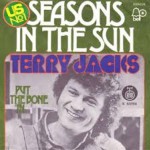
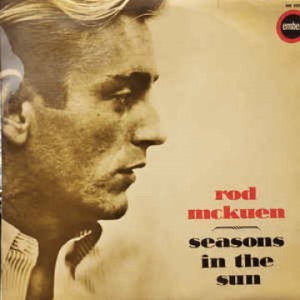

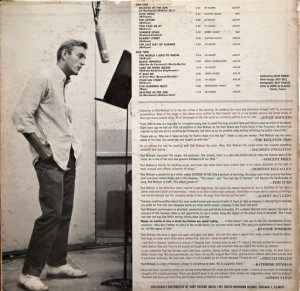
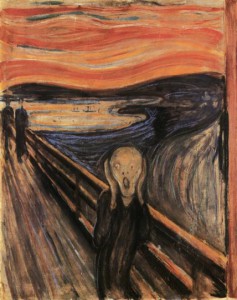

I enjoyed reading your presentation…in fact I have read it several times. I will respond separately about my thoughts about some of hat you said…lots of food for thoughts in your words.
Thanks, Mom.
Excellent essay!
Apologies if everyone is tired of talking about Kurt Cobain, but your essay reminded me that he often spoke about “Seasons in the Sun” as his favorite song. Nirvana even covered it, in a jokey fashion. (How very punk rock to make fun of one’s own fear of death!) Of course, we soon found out, sadly, that Cobain was covering up his real feelings by making a joke about them. Perhaps Brel and McKuen were doing something similar, in their own ways.
TJ’s Seasons In The Sun could not have been on a more appropriate label than Bell Records, the home to lots of hits by uncool artists like The Partridge Family, Tony Orlando & Dawn, Barry Manilow and the cast of Godspell.
I had a lot of the same feelings about this song as you did. Except 9 year old me thought he was saying goodbye to his friend, his dad, and Michelle because THEY were all dying, not him. I thought “What rotten luck, that all of them are dying at the same time.”
It wasn’t until an embarrassing number of years later that I learned the truth.
back in the mid-70’s grade school whenever we had Mrs. Anderson as a sub for music, she was in her mid to late 50’s, she would bring this 45 in for a “sing along”.. just the chorus, we were told to ignore the rest… she did this for every grade…. how many kids did she traumatize and what was she going through playing this song over and over…. it certainly scarred me and I didn’t appreciate the song until the TMJ version… which led to the Rod McKuen version
I heard this song in the back of an avocado green station wagon in like ‘78 or maybe ‘79. I wanted to cry and thought about the song a lot (I was, like you, young and malleable). Later, I did reconnect with the song (I didn’t have cool parents to rent a juke box for a party!) and it didn’t make me want to cry (it was kind of sappy)… but it does strike a cord in me, still!
Enjoyed your essay! Thanks for the info….
Great pop/rock cover of Brel’s version: https://www.youtube.com/watch?v=2d1mZykINPU
I have always liked the Terry Jacks version even though i was a bit embarrassed to say so too ardently. However, I could never quite say why. First, I a few years older than you, I believe I was 15/Grade 10 when it came out. I have a soft spot and this doubtless touched it, but there was something else I could never put my finger on. Then I heard the Jacques Brel version and I knew exactly what it was. The cynical sneering is exactly what appealed to me, and somehow I could feel that even in TJ’s version. Here’s my real thing. I believe that the JB version is a suicide note. Thinking of it that way really puts the punch in verses 3 & 4, IMO. Even if JB didn’t write it that way consciously, it adds the extra wallop that turns this into something truly cynical.
PS: I am pretty sure that i read the suicide note interpretation somewhere, but I’ve never been able to pin it down. Which means, even if that is the key, it was not widely recognized which means it’s not out there in the general discussion. But seriously, listen to JB and think of it that way and tell me a light bulb doesn’t go off. But you’re entitled to your own view.
I am no musical scholar but appreciated this in depth piece about Seasons in the Sun. I’m a bit younger than Tim, but was also always touched by this song (presumably TJ’s version) as a child in the ‘70s. I had mostly forgotten about the song until hearing the TMJ version in early ‘90s but did recall that same feeling of compelling sadness that drew me right back in.
I too always imagined a suicide note feel to it and I believe it was only through something else Tim wrote that directed me away from that interpretation. I’d be interested in seeing more about this interpretation and will now go back and listen through all the versions.
First, if the author is still looking at this, I want to express my condolences for the relatively recent loss of your thoughtful mother. Your “Thanks, Mom” comment gave me a good laugh — then I looked her up, and discovered she really is your mother. Quite an accomplished woman too.
Thanks for this fun and illuminating article on a song I grew up with as well (b1966). I was reminded of it after seeing a video with Alison Krauss, who says this song led her to buy the Terry Jacks album, her first record purchase.
This is one of several 70s AM radio hits by white people which I recently dug up (thanks to those streaming services), and listened to on a very good sound system, only to discover they all sound flat and tinny and overwrought (like the night the lights went out in Georgia, or another song by Paper Lace whose title escapes me, etc).
That said, The Band’s songs still song good, though I think their biggest AM hit is their most politically problematic. Coincidence?